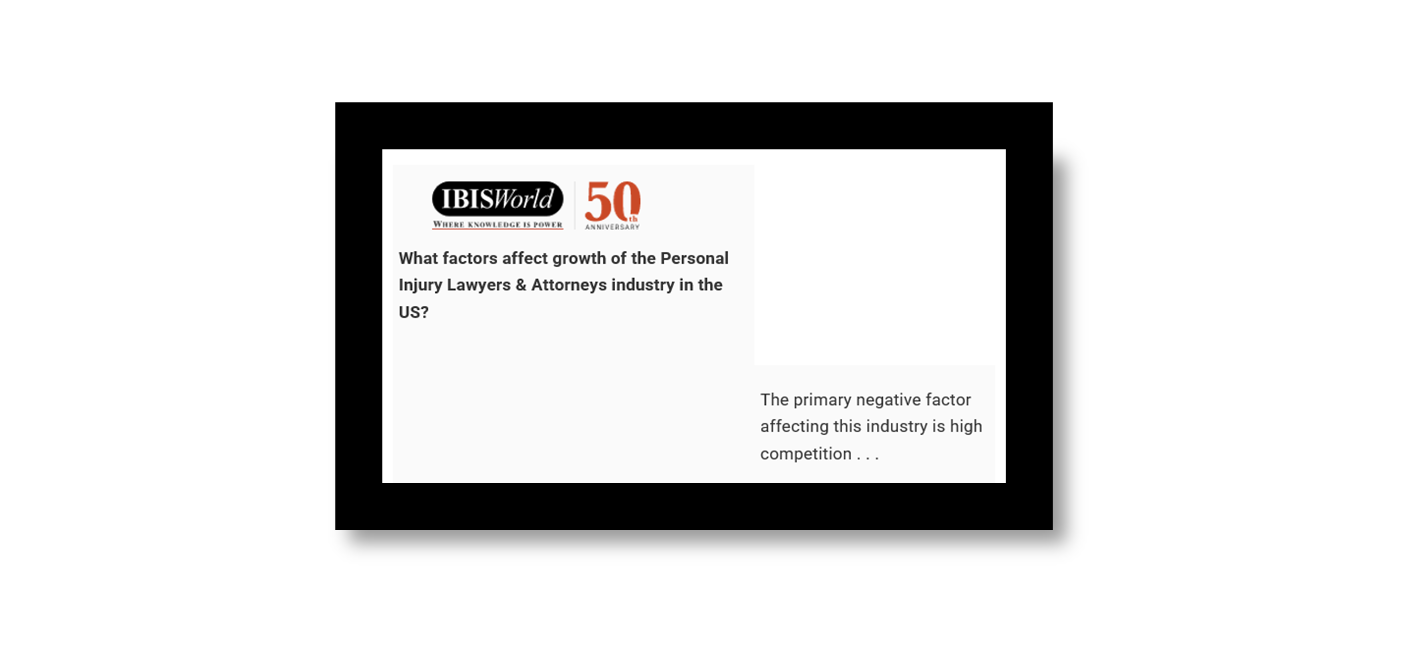If you’re a personal injury law firm, it’s hard to stand out from the competition. With the overwhelming number of personal injury lawyers in the U.S, effective copywriting isn’t a luxury. It’s a necessity. It’s not enough to be the best lawyer; you need to prove it. To be successful, you need an effective communication strategy. Your communication plan should include honest messaging, i.e., persuasive copywriting that inspires trust in your site’s visitors.
The More Compelling Your Website Copy Is, The More Clients You’re Going to Attract
When it comes to attracting personal injury clients and getting them to act, like filling out a contact form on your law firm’s website or calling your office for a consultation, it’s all about the copy. As you know, personal injury clients already feel vulnerable and may have a twinge of skepticism because of what led them to seek legal counsel, to begin with. They are trying to avoid adding legal injuries to their personal injuries.
Still, a lot of personal injury law firms rely on one-size-fits-all copywriting techniques, not realizing that this is doing more harm than good when it comes to generating leads from this incredulous crowd. What works for one personal injury brand may not work for another. Since most personal injury lawyers’ websites essentially say the same thing, you must understand how to craft the right words that will attract more of your target audience and convince them to click on your call-to-action.
Today, I am going to share 7 copywriting tips that’ll keep readers’ eyes glued to the screen, help you attract new clients, and drive conversions on your personal injury law firm website.
-
Never Be Cliché When You’re Making the Claim as to “Why We’re Different”
I recently came across a personal injury law firm whose website Homepage had a section with the subheading “Why We’re Different.” Under this curious headline, the copy proceeded to list in bullet format, five features that are common for most personal injury law firms in America that digitally promote their services, such as “never pay a fee unless you win.” Mentioning that is fine. However, using it to exemplify why you’re different, is not fine . . . because it’s patently false. It also could make a website visitor doubt the rest of what you’re saying. Remember, they are lawyer-shopping and have seen or will see that very list of features that you’re saying is unique about you, on every website they land on.
The key is to highlight what actually makes your personal injury law office different from everyone else’s. What is it that you do that no one else does? What is it that you do that’s better than what everyone else does? Find something that your office does superior to everyone else or that you do that your competitors would have a hard time imitating so that potential clients will be drawn away from another personal injury law firm and toward yours. In other words, promote your unique selling proposition.

-
Uncover and Leverage Your Law Firm’s Brand Story
Other equally qualified, locally-based personal injury lawyers can compete with you on:
- years of experience
- multi-million-dollar results
- getting on Google’s page 1
- Super Lawyers recognition
Your unique selling proposition discussed above is what will help you define your brand and your brand story. Your brand story is your elevator pitch, so to speak. It’s the starting point for any conversation you have with a potential client or referral source. Your brand story should include a quality your locally-based competitors can’t match.
One thing your competitors will have a tough time matching is the “why” of the folks that set the stage for the law firm’s brand. Your brand story is the reason why you started your personal injury law practice in the first place. What was your motivation? Your story should be consistent, and it should be authentic. Many people make the mistake of thinking that their brand story is the same as their tagline or slogan, but they’re not the same thing at all.
And it’s not just what you choose to say, but how you articulate your firm’s values that makes it easier for potential clients to align themselves with your office. Done right, this device can better entice the client who is confused or undecided as to which personal injury law firm they’d rather work with.
-
Relate to the Community You Serve and Speak to the Pain of Your Audience
The first step is to figure out who your target audience is — where they live, what they do, what they like and don’t like. What do they care about? What are their problems, challenges, and goals? Once you know those details, it will be easier to figure out how to reach them and where to reach them.
You’re taking them from where they are to where they want to be. It’s all about the journey. A happy smile is the “after” picture of your client using your services and loving what you’ve created for them.
You can then tailor your website copy to their needs and interests so that your messaging resonates with potential clients on a deeper level. Research shows that consumers are more likely to make purchases from businesses they have a personal connection with.
For example: If your personal injury law practice is in Staten Island, one way to differentiate your service could be to acknowledge that Staten Island tends to be the forgotten borough in NYC. Show what you do that reflects that that means something to you. Think long and hard about how your past attitude and actions toward folks in Staten Island reflect that what you are saying is not just lip service. It’s not enough to sprinkle the word “Staten Island” throughout your website for SEO purposes. Every attorney who practices in Staten Island can do that. Without being melodramatic or alienating any of the borough’s residents, touch on a real-life experience that aligns with the values of the community you serve. Be supportive. Be genuine. Speak their language.
-
Connect With Your Target Clients in Plain English
Your copy should be clear and concise. Don’t use a lot of flowery language if you don’t have to. The less time your visitor must spend figuring out what you mean, the better.
- Avoid using lawyer jargon: This is especially important for personal injury attorneys because many areas of law are so complicated. Use words that are easy to understand. If your audience can’t understand your jargon, they’re not going to schedule an appointment with you.
- Use engaging messaging: Your website copy should be clear, simple, and compelling. Clients don’t want to read bland, textbook-styled language. Make sure that your website copy sounds conversational. Don’t bore visitors.
- Tell your clients what to expect: Your clients should know what’s happening with their cases. Make sure the client knows how the process will go, what they should expect, and (conceivably, based on your experience with this type of case) how long it will take before any settlement or trial.
- Keep it short: In today’s post-Google era, people have very short attention spans. You need to keep things concise and to the point, if you want a website page that a user will actually read.
- Be personal: The best way to connect with potential clients is by being transparent and personal. And by personal, I mean to not only use “you” as a pronoun but also use “I” as a pronoun. This is especially true if your client base tends to include millennials.
-
Go Back and Add a Strong, Meaningful Headline to Your Homepage
The homepage headline is the first thing a visitor sees when they land on your site. It’s their first impression of your company. It’s their first taste of your brand. So, it’s extremely crucial that you get it just right. Your homepage headline should be short and sweet, but most importantly, it must be compelling and interesting to your target audience.
It should grab their attention and make them want to read more. You have only a few seconds to grab their attention, so make it count.
Here’s a tip on how to write a winning headline: Get straight to the point.
When you have a very limited space to write your headline, everything has to count. Your headline should give your visitors all the information they need from the first glance. Try this with your headline: [Benefit] [Emotional Trigger]. Here, Benefit is what your visitors will receive from visiting your site, and Emotional Trigger is the attraction that will draw them in.
-
Let Previous Clients “Write” Your Website Copy
Using testimonials and reviews on your website copy is a great way to build trust with your visitors. It’s an excellent way to convince potential clients you’ve done good work. When you have someone talking about how well your service worked for them, it makes it easier for your visitors to believe that you will do a good job for them too. People are more likely to buy services if they see that other people have had good experiences. Testimonials are a great way to humanize your brand and demonstrate the value of your service.
But using testimonials on your webpage is just one way of leveraging the power of a client’s review. Another way is to gather the testimonials and positive endorsements that you received from clients, organize them by theme, then use them as direct copy on your website.
Every business has a few recurring themes in client feedback. These are things that clients often say about your business, and this is exactly the kind of information you want to use when writing copy for a website. For example, if you hear that clients love your quick response to their phone calls, mention it as a key benefit on your site. If you often hear from clients who appreciate the sense of empowerment your service gave them, take that opportunity to tell new clients about the experience they can expect after they retain your firm.
After all, these are the advantages that clients who have hired you found important. Clearly, they will be relatable to the next potential client. It stands to reason that if past clients found them important, potential clients shopping for personal injury lawyers will too.
-
Humanize the Profiles of the Attorneys in Your Firm
Each attorney’s profile page is an opportunity for the individual personal injury lawyers at your firm to connect with your potential clients on a deeper level. In addition to allowing them to showcase their expertise and experience — and ultimately, their dedication to the clients who are looking for them, a well-designed profile is also a chance to show clients that they are approachable, which goes a long way towards building a good relationship with clients.
Take a look at the charities the attorneys support. Examine the committees they’ve been a part of. What CLE panels did they sit on? Do they have previous experience, current skillset, or hobbies they bring to the table that added unique value or perspective to the personal injury cases they’ve won? What articles have they written? Which achievement awards have they won? Have they delivered presentations on topics that would matter to a client? What cases have been their biggest or proudest honor? Why? What non-legal activities do they participate in? Do they host a podcast? What boards do they sit on? Do they spearhead a particular program? Do they donate money to or run in marathons for a particular cause?
The idea here is to make the attorneys relatable, to bring them down to eye level. This can be done by looking for themes, values, strong views that give the attorney an “in” with a particular prospect, i.e., a leg up over your competition regarding a particular practice area, a soft spot.
The attorney’s profile page is also an opportunity for the individual attorney to build connections with other personal injury lawyers who might refer business to them.
In Conclusion
It is imperative that you understand the power of your law firm’s website copy. Be as specific and page-focused as possible — and let your copy build customer engagement and value across every part of your site.
Make sure that the language you use is professional, friendly, and identifiable with your brand’s reputation.
When crafting your personal injury law firm’s website messages, it’s important to remember that every word you write comes with a purpose and a goal. A well-written website does more than just explain what your law firm does. The words you choose and the message you send are vital to its success. The best messages are suited to their ideal audiences and have your law firm’s brand’s personality shining through. They explain what differentiates you from the competition, why you’re better, and why you should be the first choice.
Hold this in mind as you write the copy for your personal injury law firm’s website. It will help you write a message that is strong, focused, and lead-generating.
Look at your website now, and ask yourself:
What is your message trying to accomplish?
Are you communicating deeply meaningful benefits rather than just features?
Is your language consistent with your brand?






One thought on “7 Website Copywriting Tips Personal Injury Lawyers Don’t Realize They Need”
Pingback: Ramp Up Your Online Presence and Draw More Clients to Your Law Firm - Legal Copywriting Central